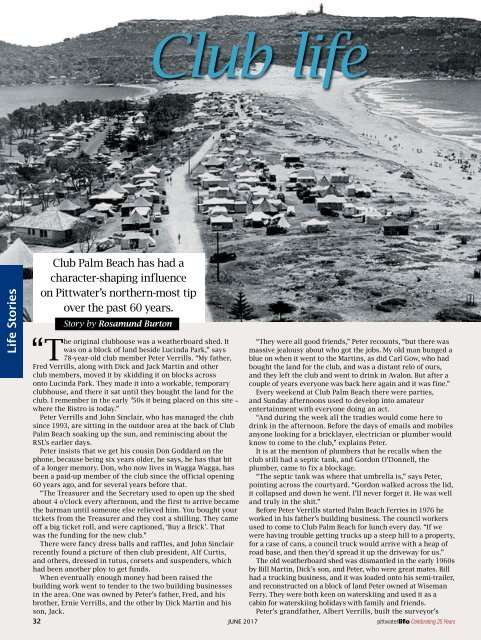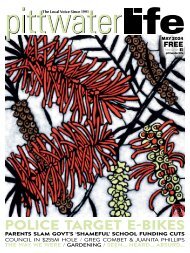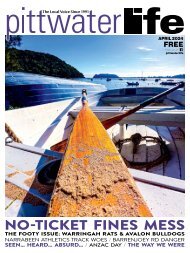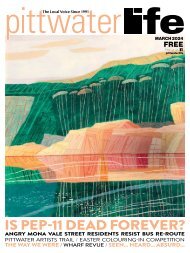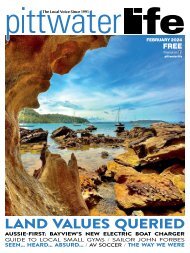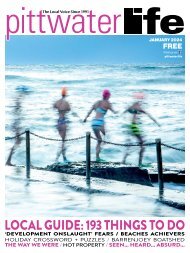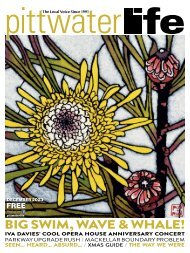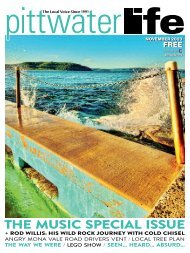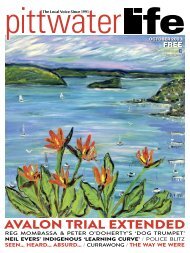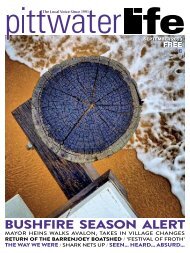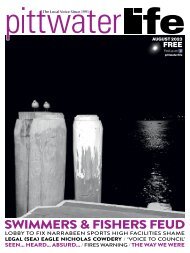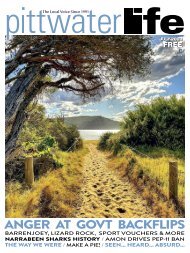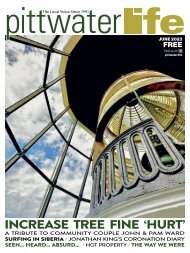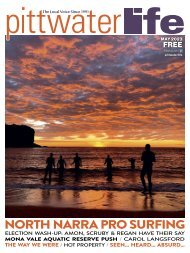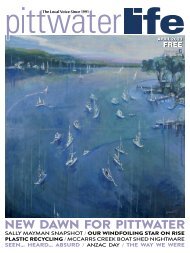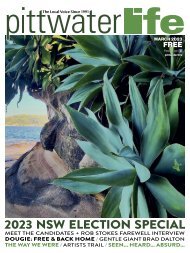Pittwater Life June 2017 Issue
Cafe Society. Exclusive Q&A: Michael Regan. Dummies Guide To The B-Line. Cash Splash.
Cafe Society. Exclusive Q&A: Michael Regan. Dummies Guide To The B-Line. Cash Splash.
Create successful ePaper yourself
Turn your PDF publications into a flip-book with our unique Google optimized e-Paper software.
Club life<br />
<strong>Life</strong> Stories<br />
Club Palm Beach has had a<br />
character-shaping influence<br />
on <strong>Pittwater</strong>’s northern-most tip<br />
over the past 60 years.<br />
Story by Rosamund Burton<br />
original clubhouse was a weatherboard shed. It<br />
was on a block of land beside Lucinda Park,” says<br />
“The<br />
78-year-old club member Peter Verrills. “My father,<br />
Fred Verrills, along with Dick and Jack Martin and other<br />
club members, moved it by skidding it on blocks across<br />
onto Lucinda Park. They made it into a workable, temporary<br />
clubhouse, and there it sat until they bought the land for the<br />
club. I remember in the early ’50s it being placed on this site –<br />
where the Bistro is today.”<br />
Peter Verrills and John Sinclair, who has managed the club<br />
since 1993, are sitting in the outdoor area at the back of Club<br />
Palm Beach soaking up the sun, and reminiscing about the<br />
RSL’s earlier days.<br />
Peter insists that we get his cousin Don Goddard on the<br />
phone, because being six years older, he says, he has that bit<br />
of a longer memory. Don, who now lives in Wagga Wagga, has<br />
been a paid-up member of the club since the official opening<br />
60 years ago, and for several years before that.<br />
“The Treasurer and the Secretary used to open up the shed<br />
about 4 o’clock every afternoon, and the first to arrive became<br />
the barman until someone else relieved him. You bought your<br />
tickets from the Treasurer and they cost a shilling. They came<br />
off a big ticket roll, and were captioned, ‘Buy a Brick’. That<br />
was the funding for the new club.”<br />
There were fancy dress balls and raffles, and John Sinclair<br />
recently found a picture of then club president, Alf Curtis,<br />
and others, dressed in tutus, corsets and suspenders, which<br />
had been another ploy to get funds.<br />
When eventually enough money had been raised the<br />
building work went to tender to the two building businesses<br />
in the area. One was owned by Peter’s father, Fred, and his<br />
brother, Ernie Verrills, and the other by Dick Martin and his<br />
son, Jack.<br />
“They were all good friends,” Peter recounts, “but there was<br />
massive jealousy about who got the jobs. My old man bunged a<br />
blue on when it went to the Martins, as did Carl Gow, who had<br />
bought the land for the club, and was a distant relo of ours,<br />
and they left the club and went to drink in Avalon. But after a<br />
couple of years everyone was back here again and it was fine.”<br />
Every weekend at Club Palm Beach there were parties,<br />
and Sunday afternoons used to develop into amateur<br />
entertainment with everyone doing an act.<br />
“And during the week all the tradies would come here to<br />
drink in the afternoon. Before the days of emails and mobiles<br />
anyone looking for a bricklayer, electrician or plumber would<br />
know to come to the club,” explains Peter.<br />
It is at the mention of plumbers that he recalls when the<br />
club still had a septic tank, and Gordon O’Donnell, the<br />
plumber, came to fix a blockage.<br />
“The septic tank was where that umbrella is,” says Peter,<br />
pointing across the courtyard. “Gordon walked across the lid,<br />
it collapsed and down he went. I’ll never forget it. He was well<br />
and truly in the shit.”<br />
Before Peter Verrills started Palm Beach Ferries in 1976 he<br />
worked in his father’s building business. The council workers<br />
used to come to Club Palm Beach for lunch every day. “If we<br />
were having trouble getting trucks up a steep hill to a property,<br />
for a case of cans, a council truck would arrive with a heap of<br />
road base, and then they’d spread it up the driveway for us.”<br />
The old weatherboard shed was dismantled in the early 1960s<br />
by Bill Martin, Dick’s son, and Peter, who were great mates. Bill<br />
had a trucking business, and it was loaded onto his semi-trailer,<br />
and reconstructed on a block of land Peter owned at Wiseman<br />
Ferry. They were both keen on waterskiing and used it as a<br />
cabin for waterskiing holidays with family and friends.<br />
Peter’s grandfather, Albert Verrills, built the surveyor’s<br />
32 JUNE <strong>2017</strong><br />
Celebrating 25 Years


